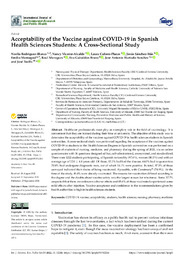Por favor, use este identificador para citar o enlazar este ítem:
https://hdl.handle.net/11000/38194Registro completo de metadatos
| Campo DC | Valor | Lengua/Idioma |
|---|---|---|
| dc.contributor.author | Rodríguez Blanco, Noelia | - |
| dc.contributor.author | Vicente Alcalde, Nancy | - |
| dc.contributor.author | Cubero Plazas, Laura | - |
| dc.contributor.author | Sánchez Más, Jesús | - |
| dc.contributor.author | Montagud, Emilia | - |
| dc.contributor.author | Moragues, Raul | - |
| dc.contributor.author | Gabaldón Bravo, Eva | - |
| dc.contributor.author | Hurtado Sánchez, José Antonio | - |
| dc.contributor.author | Tuells, José | - |
| dc.contributor.other | Departamentos de la UMH::Estadística, Matemáticas e Informática | es_ES |
| dc.date.accessioned | 2025-11-14T08:56:06Z | - |
| dc.date.available | 2025-11-14T08:56:06Z | - |
| dc.date.created | 2022 | - |
| dc.identifier.citation | International Journal of Environmental Research and Public Health | es_ES |
| dc.identifier.issn | 1660-4601 | - |
| dc.identifier.issn | 1661-7827 | - |
| dc.identifier.uri | https://hdl.handle.net/11000/38194 | - |
| dc.description.abstract | Healthcare professionals must play an exemplary role in the field of vaccinology. It is convenient that they are trained during their time at university. The objective of this study was to determine the acceptability of the vaccines against COVID-19 in health sciences students in Spanish universities. A cross-sectional study was performed regarding the acceptance of the vaccines against COVID-19 in students in the Health Sciences Degrees in Spanish universities was performed on a sample of students of nursing, medicine, and pharmacy during the spring of 2021, via an online questionnaire with 36 questions designed ad hoc, self-administered, anonymized, and standardized. There were 1222 students participating, of Spanish nationality (97.4%), women (80.5%) and with an average age of 22.0 ± 4.8 years old. Of those, 12.3% had had the disease, 44.0% had to quarantine, 70.8% had undergone diagnostic tests, out of which 14.1% were positive. In total, 97.5% of those surveyed indicated their desire of being vaccinated, if possible, with Comirnaty® (74.9%). At the time of the study, 49.6% were already vaccinated. The reasons for vaccination differed according to the degree and the doubts about vaccine safety was the largest reason for reluctance. Some 37.7% suspected that there are unknown adverse effects and 85.6% of those vaccinated experienced some mild effects after injection. Vaccine acceptance and confidence in the recommendations given by health authorities is high in health sciences students. | es_ES |
| dc.format | application/pdf | es_ES |
| dc.format.extent | 13 | es_ES |
| dc.language.iso | eng | es_ES |
| dc.publisher | MDPI | es_ES |
| dc.relation.ispartofseries | Vol. 19 | es_ES |
| dc.relation.ispartofseries | nº 19 | es_ES |
| dc.rights | info:eu-repo/semantics/openAccess | es_ES |
| dc.rights | Attribution-NonCommercial-NoDerivatives 4.0 Internacional | * |
| dc.rights.uri | http://creativecommons.org/licenses/by-nc-nd/4.0/ | * |
| dc.subject | COVID-19 | es_ES |
| dc.subject | vaccine | es_ES |
| dc.subject | acceptability | es_ES |
| dc.subject | students | es_ES |
| dc.subject | health sciences | es_ES |
| dc.subject | nursing | es_ES |
| dc.subject | pharmacy | es_ES |
| dc.subject | medicine | es_ES |
| dc.subject.other | CDU::3 - Ciencias sociales::31 - Demografía. Sociología. Estadística::311 - Estadística | es_ES |
| dc.subject.other | CDU::6 - Ciencias aplicadas::61 - Medicina::614 - Higiene y salud pública. Contaminación. Prevención de accidentes. Enfermería | es_ES |
| dc.title | Acceptability of the Vaccine against COVID-19 in Spanish Health Sciences Students: A Cross-Sectional Study | es_ES |
| dc.type | info:eu-repo/semantics/article | es_ES |
| dc.relation.publisherversion | https://doi.org/10.3390/ijerph191912244 | es_ES |

Ver/Abrir:
2022-ijerph-19-12244-v2.pdf
935,81 kB
Adobe PDF
Compartir:
 La licencia se describe como: Atribución-NonComercial-NoDerivada 4.0 Internacional.
La licencia se describe como: Atribución-NonComercial-NoDerivada 4.0 Internacional.
.png)